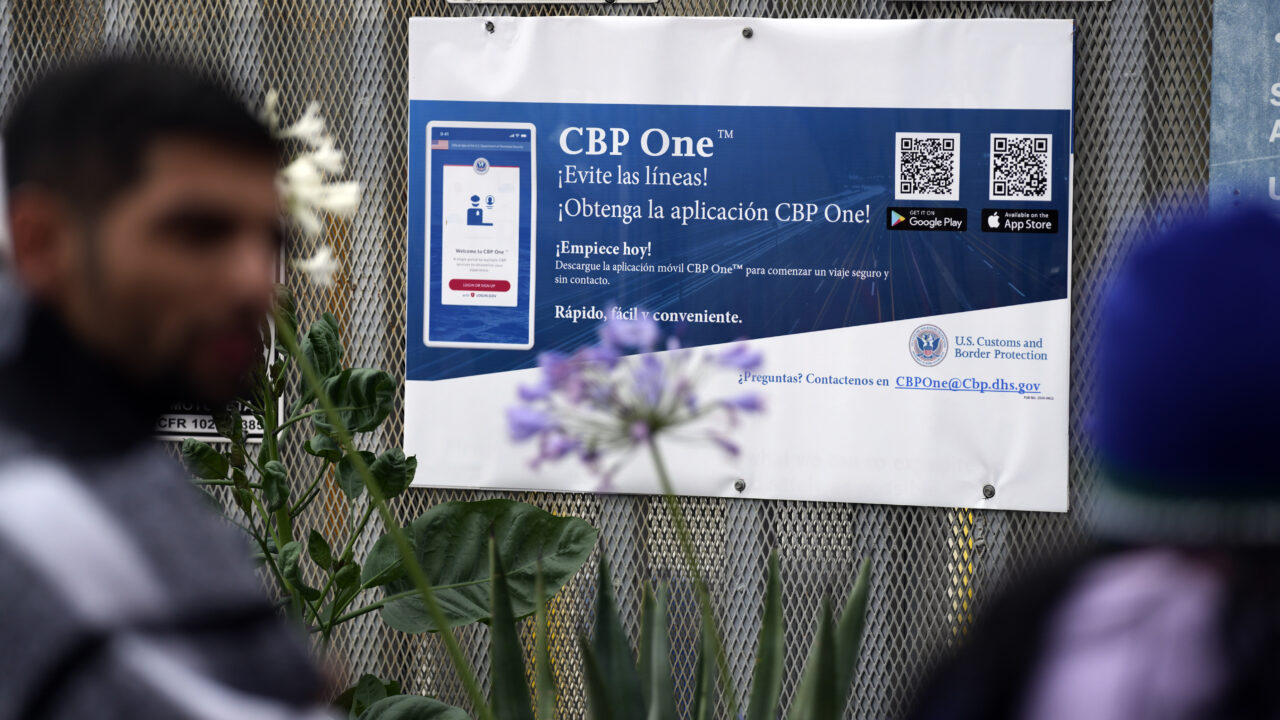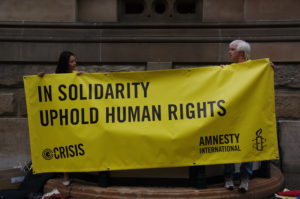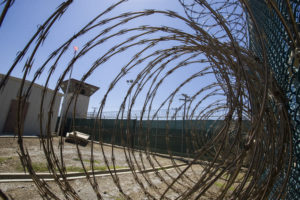An Asylum App for the Phoneless
CPB One was supposed to streamline asylum for migrants and officials alike. There was just one problem. People waiting to apply for asylum stand in front or a sign for the CBP One app as they camp near the pedestrian entrance to the San Isidro Port of Entry, linking Tijuana, Mexico with San Diego, Thursday, June 1, 2023, in Tijuana, Mexico. (AP Photo/Gregory Bull)
This is Part of the "At the Border" Dig series
People waiting to apply for asylum stand in front or a sign for the CBP One app as they camp near the pedestrian entrance to the San Isidro Port of Entry, linking Tijuana, Mexico with San Diego, Thursday, June 1, 2023, in Tijuana, Mexico. (AP Photo/Gregory Bull)
This is Part of the "At the Border" Dig series
In early 2023, Customs and Border Patrol issued CPB One, a phone app in an attempt to make the border crossing process more orderly for asylum seekers and Border Patrol agents. With tens of thousands of migrants arriving at dozens of spots along the border daily, the agency hoped the app would help funnel more of these vulnerable people fleeing violence and economic crises through official ports of entry. “What we are really trying to do here is incentivize migrants to use safe, lawful and orderly pathways,” a DHS official told NPR last May.
In theory, the smartphone app would allow migrants to easily make appointments with Border Patrol agents at designated ports-of-entry to conduct “credible fear” interviews to determine their eligibility for asylum.
In practice, the app’s rollout has been mixed, at best, and its intentions are being called into question by critics. According to migrant advocates and human rights groups, CPB One prioritizes migrants with the means to access smartphones and who can afford to spend months in Mexico waiting for an appointment. Five months after its release, Amnesty International declared the CBP One app a violation of international asylum law by imposing a hurdle — the use of a technological apparatus — to seeking asylum. Many migrants simply do not own a smartphone — or have lost it due to frequent theft on the migrant trail. A cap of 1,450 appointments can be made per day, typically scheduled months in advance, which forces migrants to refresh the app every 24 hours to see if they’ve won the digital lottery.
Many migrants simply do not own a smartphone — or have lost it due to frequent theft on the migrant trail.
Amnesty has also criticized the app for violating privacy laws by giving the U.S. government real-time location data on migrants hoping to reach the border, including their official names and identification numbers. Last May, two nonprofit organizations, Al Otro Lado and Haitian Bridge Alliance, as well as nine individuals, sued the federal government over the app’s shortcomings. The case is currently making its way through the courts in California.
Some 65 million appointments have been requested in the past 15 months using CPB One — which is famously glitchy — but only an estimated 450,000 migrants have successfully used the app to enter the United States.
Fear of running out of money or being kidnapped means most migrants will continue to choose to forgo the app and cross the border between ports-of-entry. Though critics feel CPB One puts migrants at further risk, its defenders insist the app helps to streamline the work of Border Patrol agents, herding a significant portion of migrants into known places at specific times for processing, and thus frees up resources to devote to those most in need. This debate will continue under the new Biden executive order that further restricts access to the asylum system, a policy that will push some migrants to rely on CBP One, and others to find new and more dangerous ways around it.
Your support is crucial…With an uncertain future and a new administration casting doubt on press freedoms, the danger is clear: The truth is at risk.
Now is the time to give. Your tax-deductible support allows us to dig deeper, delivering fearless investigative reporting and analysis that exposes what’s really happening — without compromise.
Stand with our courageous journalists. Donate today to protect a free press, uphold democracy and unearth untold stories.






You need to be a supporter to comment.
There are currently no responses to this article.
Be the first to respond.